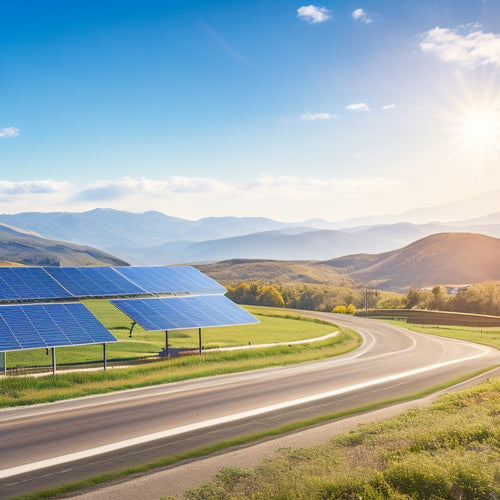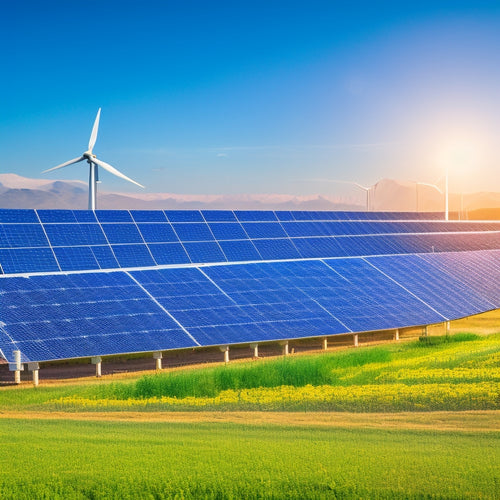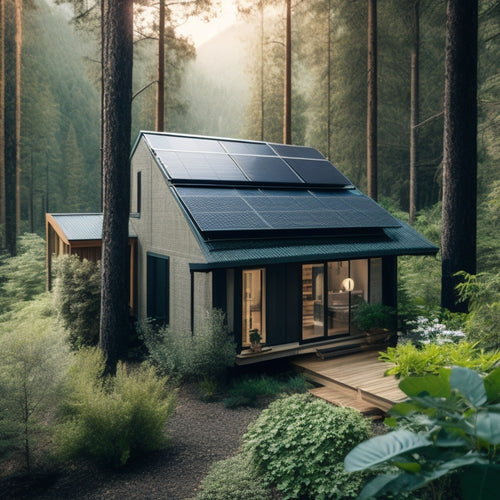
5 Best Home Energy Storage Systems
Share
You're about to uncover the top 5 home energy storage systems that can slash your energy bills by up to 90% and give you unparalleled control over your energy usage. Lithium-ion batteries stand out for their 10-15 year lifespan and lower installation costs of $800-$1,200 per kWh. Solar power storage solutions integrate seamlessly with solar panels, allowing you to store excess energy for nighttime or cloudy day usage. Advanced energy management systems enable real-time monitoring and optimization of your energy usage. By investing in these systems, you'll not only reduce your energy bills but also your carbon footprint - and that's just the starting point for achieving true energy independence.
Key Takeaways
- Lithium-ion batteries are a top choice for home energy storage due to their 10-15 year lifespan and lower installation costs of $800-$1,200 per kWh.
- Solar power storage solutions integrate solar panels with batteries to enhance energy independence and reduce grid reliance.
- Advanced energy management systems provide real-time monitoring and identification of inefficiencies to reduce energy consumption and achieve grid independence.
- Renewable energy storage options include solar-plus-storage, grid-tied, off-grid, and hybrid systems to reduce energy bills and carbon emissions.
- Efficient home energy systems require a comprehensive approach that combines energy storage, monitoring, and optimization to achieve maximum energy independence.
Top Energy Storage Systems
Among the plethora of home energy storage systems available in the market, a select few stand out for their exceptional performance, reliability, and cost-effectiveness.
You'll find that these top systems utilize state-of-the-art lithium technology to maximize energy storage capacity and efficiency. This results in a significant reduction in your energy bills and carbon footprint.
Furthermore, these systems are designed to seamlessly integrate with the grid, allowing you to capture excess energy generated by your solar panels or wind turbines during the day and use it when you need it most.
With advanced grid integration capabilities, you can even sell excess energy back to the grid and earn credits.
Key features such as modular designs and smart technology enable scalability and remote monitoring, further enhancing user experience.
Best Battery Options for Homes
You've narrowed down your search to the top energy storage systems, and now it's time to investigate the best battery options for your home. When selecting a battery, consider factors like battery lifespan, installation costs, and compatibility with your energy storage system. Here's a comparison of three popular battery options:
| Battery Type | Lifespan | Installation Cost |
|---|---|---|
| Lithium-Ion | 10-15 years | $800-$1,200 per kWh |
| Lead-Acid | 5-7 years | $500-$800 per kWh |
| Flow Battery | 10-20 years | $1,000-$1,500 per kWh |
Lithium-ion batteries are a popular choice due to their long lifespan and relatively low installation costs. Lead-acid batteries are more affordable upfront but have a shorter lifespan, increasing overall costs. Flow batteries offer a long lifespan but come with higher installation costs. Assess your energy needs and budget to determine the best battery option for your home.
Solar Power Storage Solutions
When considering a home energy storage system, integrating solar power storage solutions can greatly enhance your energy independence and savings.
By combining a solar panel system with a solar battery, you can store excess energy generated during the day for use during the night or on cloudy days. This reduces your reliance on the grid and lowers your electricity bills.
With advanced system designs that optimize energy storage for specific needs, including backup power and autonomous operation remote monitoring capabilities, you can guarantee a dependable power source when the grid is unavailable.
With a solar power storage solution, you can optimize your energy usage and maximize your savings. A high-quality solar battery can provide a reliable and efficient source of backup power, assuring you have energy when you need it most.
Efficient Home Energy Systems
Optimizing your energy storage with solar power is just one aspect of creating an efficient home energy system. You also need to contemplate smart energy management, which involves monitoring and controlling your energy usage in real-time. This allows you to identify areas of inefficiency and make adjustments to reduce your energy consumption.
| Feature | Benefit | Description |
|---|---|---|
| Smart Energy Management | Real-time monitoring | Track your energy usage and adjust your habits to reduce consumption |
| Grid Independence | Reduced reliance on grid | Store excess energy for later use, reducing your reliance on the grid |
| Energy Efficiency | Lower energy bills | Identify areas of inefficiency and optimize your energy usage |
Renewable Energy Storage Options
As homeowners increasingly adopt renewable energy sources like solar and wind power, the need for efficient energy storage solutions has become more pressing.
You're likely aware that solar incentives have made renewable energy more accessible, but what about storing that energy for later use? By investing in renewable energy storage, you can greatly reduce your energy bills by using stored energy during peak hours energy independence and contribute to a cleaner environment by lowering carbon emissions.
You have several renewable energy storage options to evaluate:
-
Solar-Plus-Storage Systems: Combine solar panels with energy storage systems to store excess energy generated during the day for use at night or during power outages.
-
Grid-Tied Systems: Allow you to store excess energy in the grid and draw from it when needed, providing a seamless shift between grid power and stored energy.
-
Off-Grid Systems: Ideal for remote locations, these systems store energy locally and provide power independence.
- Hybrid Systems: Combine different energy sources, such as solar and wind power, with energy storage to provide a reliable and efficient energy supply.
These options enable you to maximize your renewable energy investment and guarantee a stable energy supply.
Frequently Asked Questions
Can I Install an Energy Storage System Myself?
As you begin a quest for energy independence, you may wonder if you can be the expert builder of your own energy storage system. While DIY installation may seem tempting, safety considerations should be your guiding light, warning you of the dangers lurking in complex electrical systems.
How Long Does It Take to Charge a Home Energy Storage System?
When you charge your energy storage system, you'll want to know that the charging time depends on the system's capacity, charging efficiency, and power input, typically ranging from 2-10 hours, depending on the specific system and your energy needs.
Are Energy Storage Systems Compatible With All Electrical Panels?
You'll find that energy storage compatibility varies across electrical panel types, with some systems requiring specific panel configurations or upgrade kits to guarantee seamless integration, so it's essential to assess your panel's compatibility before installation.
Can I Use Multiple Energy Storage Systems in My Home?
You're wondering if you can use multiple energy storage systems in your home, and the answer is yes, you can, especially with hybrid systems, which can optimize your energy usage; plus, you might be eligible for financial incentives, making it a more attractive option.
Do Energy Storage Systems Have a Warranty or Guarantee?
You'll be pleased to know that most energy storage systems come with a warranty, typically ranging from 5 to 10 years, which covers defects and performance issues, as well as a separate performance guarantee that guarantees peak energy output over its lifespan.
Related Posts
-

Is Switching to Green Energy Solutions Easy
Switching to green energy solutions isn't just easy; it's also beneficial. You can greatly cut utility costs and enjo...
-

The Role of Battery Monitoring Systems in Renewable Energy
Battery monitoring systems play an essential role in renewable energy by enhancing system longevity and optimizing pe...
-

Off Grid Solar Batteries
As you shift to off-grid living, you'll rely on high-performance solar batteries to store excess energy generated by ...


